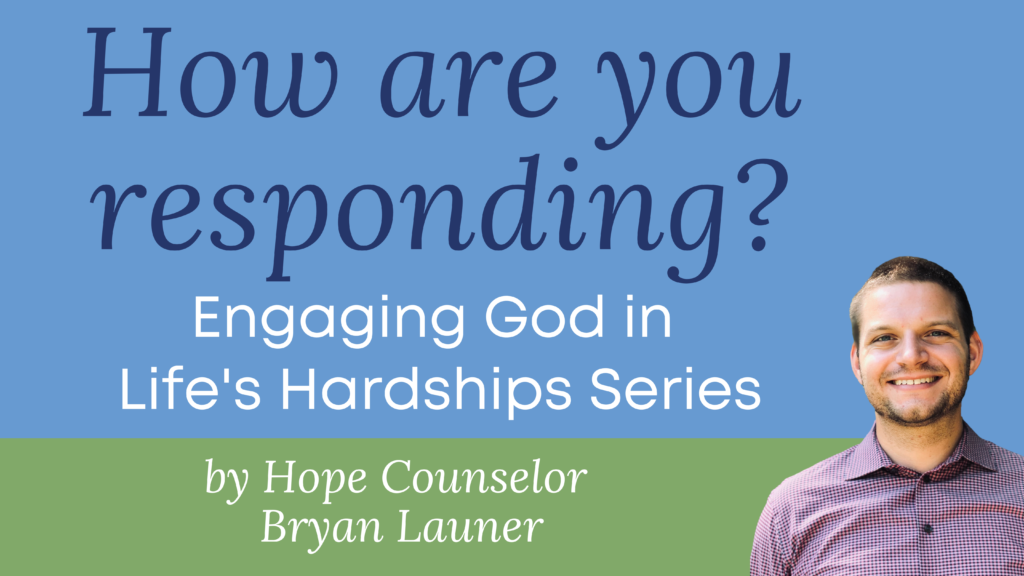This Summer, we’ve been exploring how we can engage God in the midst of the struggles and sufferings of life. In June, I was asked “what are you facing today?” As exiles living in a broken world, we should expect that we will face hardships and things that are not the way they’re supposed to be. The Apostle Peter even exhorts 1st Century Christians: “Beloved, do not be surprised at the fiery trial when it comes upon you to test you, as though something strange were happening to you” (1 Peter 4:12). And yet, suffering and hardship still confound us.
 As we identify the hardships that we’re facing today, our next question is “How are you responding to what you are facing?” How do you react when things go awry? What’s your response when you’re betrayed by a co-worker, when your health fails you, when you don’t get what you deserve?
As we identify the hardships that we’re facing today, our next question is “How are you responding to what you are facing?” How do you react when things go awry? What’s your response when you’re betrayed by a co-worker, when your health fails you, when you don’t get what you deserve?
In every circumstance, we always have a choice. Will we respond in faith, crying out to the living God and trusting him to work in us and our circumstances, or will we turn inward, looking for resources within ourselves to navigate life’s troubles? When we are slandered, will we respond like Christ who was blameless in his speech and entrusted himself to the One who judges justly (1 Peter 2:22–23)? Or do we choose cursing and complaining? Do we cry out in psalm-like faith, or do we wallow in self-pity and fruitless rumination?
Why do you respond like that?
David Powlison helpfully illustrated our personal responsibility in our response to suffering. In the classroom, he would take the cap off of a water bottle and shake it until some of the water spilled out and onto the floor. He would then ask “why is there water on the floor?” Inevitably, a student would respond, “because you shook the water bottle.” Dr. Powlison would reply: “There’s water on the floor because there’s water in the bottle. If there was orange juice in the bottle, there would be orange juice on the floor.”
Our response to suffering is a reflection of what’s going on in our hearts. Hardships do not cause our responses. Suffering is like shaking the water bottle: it draws out what’s already inside. As Jesus says in Luke 6:45, “for out of the abundance of the heart his mouth speaks.”
What comes out of your heart when things are not going right? Do you get frustrated and irritable? Do you gossip and complain with your friends? Do you get fearful and full of angst? Do you get discouraged and throw up your hands in the futility of life in a broken world? As Dane Ortlund highlights from Psalm 71, “The psalmist, however, teaches us that pain is not meant to numb us and cause our hearts to withdraw; pain is meant to draw our hearts up to God: ‘From the depths of the earth you will bring me up again’ Psa. 71:20” [1]
How do we change our response?
When we consider our negative responses to hardships, it would be tempting to tell ourselves to just stop acting that way. Don’t get angry or don’t complain or don’t get discouraged. After all, we want to respond rightly even when we’re mistreated. However, sanctification is not as simple as stapling good fruit to a bad tree. “For no good tree bears bad fruit, nor again does a bad tree bear good fruit, for each tree is known by its own fruit. For figs are not gathered from thornbushes, nor are grapes picked from a bramble bush” (Luke 6:43–44).
In order for our responses to change, we need our hearts and desires to change. Blessedly, this is precisely what God promises to do for his children. In Ezekiel 36:26, God says: “And I will give you a new heart, and a new spirit I will put within you. And I will remove the heart of stone from your flesh and give you a heart of flesh.” For believers in Jesus Christ, God has given a new heart and he promises to continue re-shaping our hearts into the image of his Son.
This progressively sanctifying work of conforming our hearts and minds to Christ is the work of discipleship and it’s the distinctive goal of biblical counseling. Our goal is to encounter a Redeemer who transforms our desires so that we respond differently. He does not promise that we will not encounter hardships in this life. But he does promise to work in us so that we think, speak, and act in ways that are consistent with life in his kingdom. In 1 Thessalonians Paul prays: Now may the God of peace himself sanctify you completely, and may your whole spirit and soul and body be kept blameless at the coming of our Lord Jesus Christ. He who calls you is faithful; he will surely do it (1 Thessalonians 5:23–24).
Take a few minutes to consider how you are responding in the midst of your hardships. Next time, we’ll explore how we can encounter this Redeemer in our precise moments of need and how God’s Word speaks to us as we face troubles and trials.
[1] Dane Ortlund, In the Lord I take Refuge (Wheaton: Crossway, 2021), 195.

 As we identify the hardships that we’re facing today, our next question is “How are you responding to what you are facing?” How do you react when things go awry? What’s your response when you’re betrayed by a co-worker, when your health fails you, when you don’t get what you deserve?
As we identify the hardships that we’re facing today, our next question is “How are you responding to what you are facing?” How do you react when things go awry? What’s your response when you’re betrayed by a co-worker, when your health fails you, when you don’t get what you deserve?